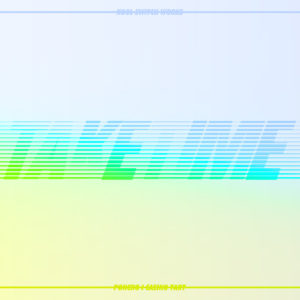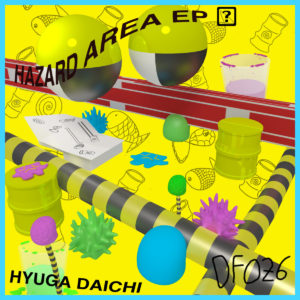Plenty of people can make beats, but a sign of an artist to keep an eye on is someone who can make a beat feel like a story. Firemj — “fire emoji,” if I’m reading closely enough — pulls that off on “Night Coast,” a number that uses pacing to its advantage and shows that a little extra thought can go a long way. It boils down to the decision not to rush out the vocal sample — many tracks out there push vocals and other gooey bits right away to grab attention, but ultimately detract from the force of these elements. Not so here, where Firemj spends over two minutes setting the table before letting the emotional howitzer loose. Call it a reminder for patience, or just let “Night Coast” play out. Listen above.
New Poncho + Casino Tart: “Take Time”
Some swift, good juke courtesy of Osaka’s Poncho + Casino Tart on their latest release. The two Satanicpornocultshop members craft a pretty simple but deeply pleasing track with “Take Time,” letting some flute-like sounds do their breezy thing while some helium-ed up vocal samples run over, adding a wooziness to every second of the song. It’s fun! The remix version tacked on feels like they took all the voices and just re-sprinkled them over the music, meaning it carries all the same energy but in a slightly different order. Together, it’s like one big turn up. Get it here, or listen below.
New Yurufuwa Gang: “Palm Tree”
One of the more jarring experiences you can have at a Japanese rap show is watching a relatively straightforward performer go on…and then be followed by Yurufuwa Gang. Recently, I watched Keiju of collective Kandytown (once known as Young Juju) play club Unit to an excited crowd, and like a lot of Japanese rappers, it felt more like a guy trying too hard to re-create what’s happening Stateside at the expense of anything interesting (kids LOVE “Lonely Nights” though). Fun, but a little frail. Yurufuwa Gang followed, and delivered 30-some minutes of wonky rap, drawn mainly from last year’s excellent Mars Ice House, ending their set with harsh screaming that made me worry for my ears. They are on their own planet, and thank god for that.
“Palm Tree” practically exists as vapor. The beat is barely there, giving way to synth washes. Sophiee’s verses dissolve almost as soon as the words leave her mouth, and while Ryugo Ishida ends up a little more solid, the music also swallows him up as everything drifts by. This is barely there, more a wisp of smoke or fleeting memory then rave up. While parallels can be drawn to American artists quite easily — part of my enjoyment of “Palm Tree” stems from Playboi Carti’s Die Lit being my most-listened-to US album of 2018 so far — the pair find their own space in this ether, creating something warm, inviting and a little melancholy. It’s their own corner, far from everyone else in Japanese hip-hop, and it’s where they come up with some of the country’s best ideas. Listen above.
New Zombie-Chang: “Mona Lisa”
Zombie-Chang constructs an offbeat world in her music, but the foundation of that comes from the past. “Mona Lisa,” off of an album coming out this week (geez is this year zooming by….), reminds of the artists that she draws influence from, while allowing her room to splash her own personality into it. Really, just peer back to early and mid-’80s Japanese music — “techno-pop” for a wide, often not accurate term, encompassing everything from Akiko Yano to Halmens to P-Model — and you can find ideas that Zombie-Chang is riffing on here, from the machine-generated music pushing everything forward to the half-winked male backing vocals. “Mona Lisa” is a shambling pop number, but it also allows plenty of space for Zombie-Chang to flex her oddball lyricism and singing voice, the latter in particular vital to this song and her whole catalog (put her on the growing list of “artists with less-than-polished voices who make that a big plus”). And at a moment where a lot of artists in Japan are trying out more serious (or at least serious-sounding) looks, it’s nice to here some silly escapism. Listen above.
Sweltering Acid: Hyuga Daichi’s Hazard Area EP
In the unexpectedly solid combos department, sweltering hot July days make for a good time to listen to acid house. Hokkaido’s Hyuga Daichi delivers a melter of an EP in Hazard Area, which just doubles down on acid sounds to create these high-energy dance numbers that somehow sound even better as sweat trickles down your face (maybe I should just turn on my air conditioner?). Daichi approaches the tracks here from a slow-burning dancefloor angle (see the twin monsters in the back to back “Re-Hi01” set, which build up to delirious finishes) to just being direct and uptempo (“Saitama Neo Sonic”). Get it here, or listen below.


